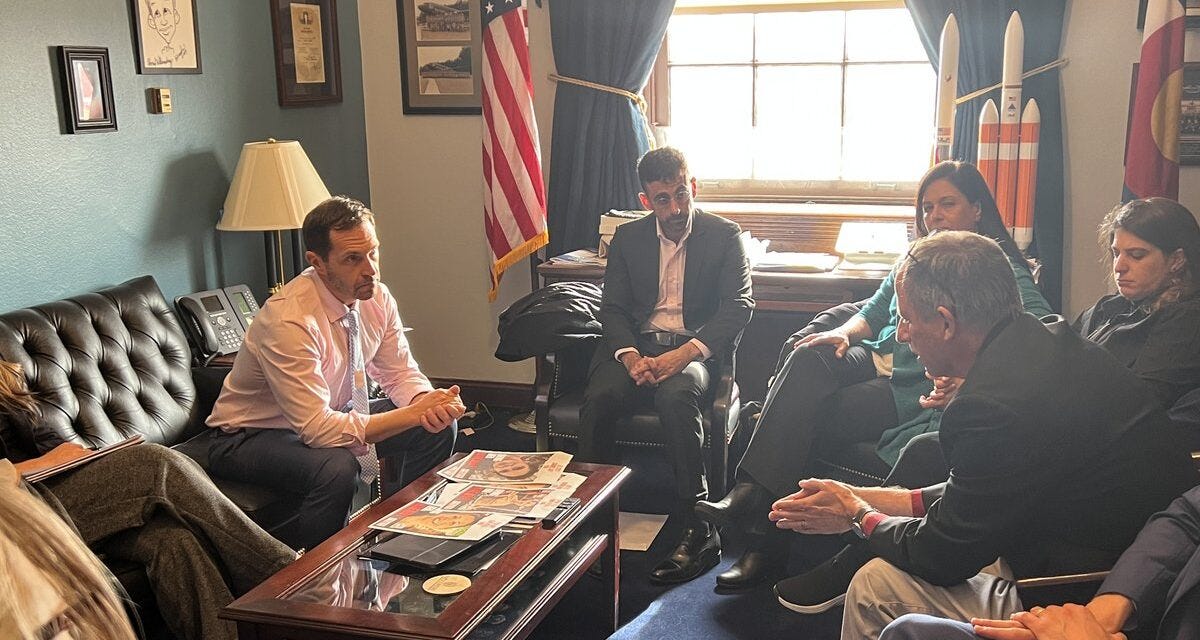Congressman Jason Crow Discusses the Israel-Palestine Crisis and How Not To Repeat the Mistakes of the War on Terror
A rising star in Democratic foreign policy circles explains his thinking
I caught up with Congressman Jason Crow at the Halifax International Security Forum, a major global security conference held each year in Nova Scotia that brings together military officials, politicians, media and foreign policy leaders from allied democracies.
Congressman Crow is a Democrat from Colorado, first elected in 2019 and someone widely viewed as a rising star in national security and foreign policy circles. We discuss the Israel-Palestine crisis, kicking off with his views on the propriety of an immediate ceasefire. We then discuss the impact this crisis is having in the broader Middle East, on domestic politics in the United States -- and why Israel should not repeat the mistakes of the US War on Terror.
We recorded our conversation last Friday evening. As I’m sending this out, it looks as if the Israeli government is close to approving a temporary ceasefire that would include the release of many hostages held by Hamas. Our conversation provides some vital context for understanding the implications of a potential pause in fighting.
The episode is freely available on all podcast listening platforms. The link will direct you to Apple Podcasts, Spotify and more.
This excerpt is edited for clarity
Mark Leon Goldberg So to kick off, I'd like your view on the propriety of an immediate cease fire in Gaza and Israel right now. What's your current thinking on that?
Congressman Jason Crow Well, I've been very clear that Israel has a right to defend itself and to respond to the terrorist attack of October 7th. We also learned a lot of lessons during our 20 year war against terror. We spent over $3.5 trillion, over 6000 American lives and tens of thousands of other lives taken around the world. And in some ways, our credibility, too. And we spent all that time and effort, and yet we still deal with the threat of ISIS and al Qaeda. So the lesson that I draw from that is that you cannot address terrorism with military means alone, that you have to couple that with diplomatic and humanitarian aid and a political resolution. So I am concerned that right now we are on a path where we don't have the right proportion of diplomatic and humanitarian concern about this issue and that it's being done solely through a military lens and that ultimately that that won't be successful.
So what I have called for is a humanitarian pause. And why I think the humanitarian pause is the right way to go about this is because we're asking for Israel to do something, right? A ceasefire implies that all parties to the conflict have both the capability and the willingness to abide by a ceasefire. Hamas has neither of those things. And Hamas, by definition, is a terrorist organization that lives outside of rules, doesn't agree to rules and in many ways is the definition of terrorism and how terrorist groups act. And Hamas is also not a monolith. We also know that it's a compilation of a dozen different groups for different command structures. So even if you got one command structure, one group to abide by, it doesn't mean that the others would. So it's in my view, it could not be effectuated. That's why a humanitarian pause, I think, is the right way to go about this, I guess.
Mark Leon Goldberg Is there a contradiction, though, in your invocation of the need for more diplomacy and more humanitarian aid and then advocating a lesser humanitarian pause versus a more broad cease-fire? Humanitarian pauses are what the Biden administration has been calling for now for a few weeks, yet it seems that Israel is not abiding by humanitarian pauses -- that does not seem to be happening.
The full transcript is available immediately for paid subscribers. This includes:
Congressman Crow’s views of the potential for regional escalation of this conflict elsewhere in the Middle East
His views of the International Criminal Court’s investigation into Israel and Palestine
The implications of this crisis on domestic politics in the United States, particularly for the left-of-center coalition ahead of next year’s presidential elections
The odds that Congress will pass a supplemental spending bill to support Ukraine and Israel
Please support the show with your upgraded subscription. While supplies last, we’ll send you a lovely Global Dispatches sticker in the mail!




